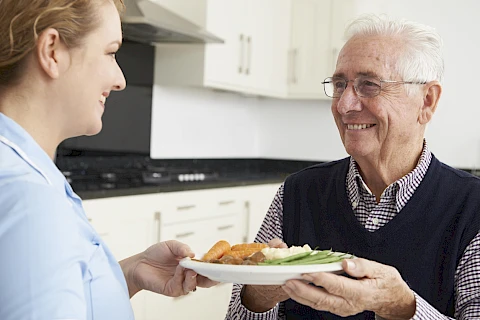
Taking care of seniors with Alzheimer's involves many responsibilities, one of which is ensuring food safety. For seniors, particularly those with Alzheimer's, food safety is vital due to the increased risk of foodborne illnesses, which can impact their already vulnerable health. Caregivers face unique challenges in maintaining a safe and healthy eating environment. Senior Helpers Canada will equip caregivers with practical and effective tips to ensure that seniors with Alzheimer's receive nutritious and safe meals.
Tip 1: Maintain a Clean Kitchen Environment
A clean kitchen is the first line of defence against foodborne illnesses. It is essential to keep surfaces, utensils, and hands clean at all times to prevent contamination.
- Clean countertops and surfaces regularly with disinfectant.
- Make it a habit to wash your hands thoroughly before and after handling food.
- Ensure all dishcloths and sponges are sanitized or replaced regularly.
By maintaining a hygienic kitchen environment, the risk of food contamination is significantly decreased, providing a safe space for meal preparation.
Tip 2: Monitor Food Expiry Dates
Checking the expiry dates on food items is crucial, especially when caring for seniors who may not notice or remember them. Organize food items by placing newer items behind older ones. Regularly check expiry dates and discard any foods that are past their prime. Monitoring food expiry dates prevents the consumption of expired goods, ensuring seniors stay healthy and avoid foodborne illnesses.
Tip 3: Practice Safe Food Storage
Proper food storage helps maintain food freshness and prevents spoilage. Store perishable foods in the refrigerator at the proper temperature. Use airtight containers to keep food from contamination.
Label items with the date of purchase for better tracking. Organizing the refrigerator and pantry not only extends the freshness of food items but also minimizes waste, ensuring that meals are both safe and economically efficient.
Tip 4: Supervise Meal Preparation
Supervising meal preparation is an excellent way to safeguard against accidents and food safety risks. Always have a caregiver present during meal prep. Involve seniors in simple, safe cooking tasks to encourage participation. This oversight ensures meals are prepared correctly, and engaging seniors in the process adds a sense of accomplishment and fun to their daily routine.
Tip 5: Be Mindful of Dietary Restrictions
Seniors with Alzheimer's may have specific dietary needs or restrictions. It's vital to plan meals with these in mind. Consult with a healthcare professional to understand any dietary restrictions. Plan meals that incorporate the necessary nutrients and avoid any harmful foods. Meal planning with a focus on specific dietary needs promotes overall nutritional health and prevents adverse reactions, contributing to the senior's well-being.
Tip 6: Educate on Safe Food Handling Practices
Teaching seniors basic yet vital food handling practices can make a significant difference. Encourage regular handwashing before and during food prep. Demonstrate how to avoid cross-contamination by keeping raw and cooked foods separate. Reinforcing these practices empowers seniors to interact more safely and confidently with their food, promoting a sense of independence and engagement.
Get Food Safety Support From Senior Helpers
Food safety is one component of caring for seniors with Alzheimer's. By implementing these tips, caregivers can significantly enhance the safety of meals, contributing to the overall health and well-being of their loved ones.
By taking these precautions, caregivers ensure a nurturing and secure setting for meals. For personalized Alzheimer's care and support, contact Senior Helpers Canada.